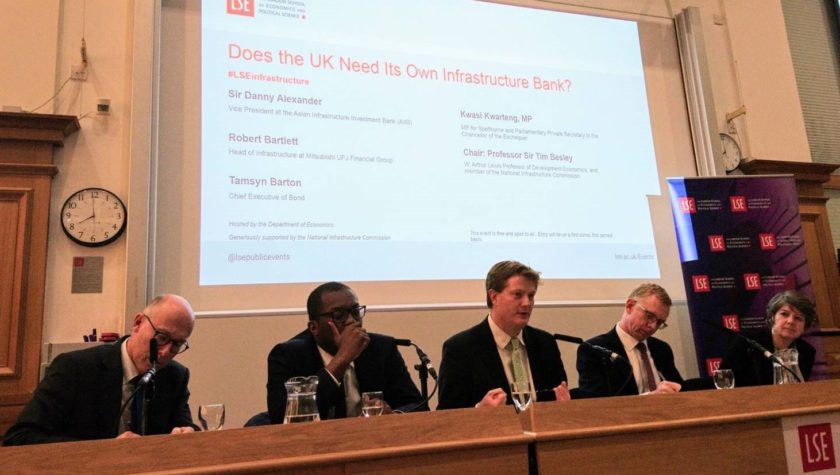I’ve been spending a lot of my time in the past few months trying to get the bottom of an apparent paradox.
An often cited McKinsey & Company report states that the world has an $800 billion annual infrastructure finance gap. On the one hand, institutional investors around the world have large volumes of capital looking for long-term projects with stable revenue streams – characteristics often possessed by infrastructure projects. On the other, most developed economies have either national or access to supranational institutions to help finance their infrastructure. The question is: if there’s all that money sloshing around, why are those institutions needed?
This apparent paradox underscores the issue that the work which I’m leading for the Commission in the upcoming National Infrastructure Assessment seeks to address: whether a new UK Infrastructure Bank is needed. The salience of the issue is underlined by the UK’s potential loss of access to the European Investment Bank (EIB) after Brexit and follows the privatisation of the Green Investment Bank in 2017.
The answer is not as simple as a choice between public or private expenditure to meet this need. The scale of the challenge makes the mobilisation of private capital crucial. There is no ambivalence on the part of private investors; I attended an interesting forum held by the OECD and Long Term Infrastructure Investors Association in Paris in October 2017 to understand the good work going into further developing infrastructure as an asset class.
Instead, the crux of the issue is essentially whether the supply of private finance can meet demand. In true policy-maker fashion, the answer to the question of whether the two align is ‘yes, but’. Yes: infrastructure projects with a viable revenue stream within acceptable risk parameters are likely to receive private financing. But: as the risk of projects creeps higher – and conditions, such as long tenor, are sought – interest from private investors may dip, especially if the projected returns do not provide a powerful enough incentive.
However, it is precisely such projects – namely those involving new technologies – which may have wider national benefits as the UK looks ahead to innovative ways of meeting its climate change targets and improving the efficiency of its ageing infrastructure.
By contrast, these are the kinds of functions which national financing institutions – generally established to advance the public good – can bring. Some have argued that the EIB and GIB have performed this function recently in the UK by helping to crowd in private investors to projects, providing a powerful signal to the market, offering independent expertise, and promoting policy stability which is detached from the political cycle.
Institutions may not be the only way of providing such functions. The Government already has a guarantee scheme in place and has the powers to offer direct loans to projects, supported by the in-house expertise of the Infrastructure and Projects Authority. A new institution would also need time and money to establish itself. A new institution would not be an effective way to address any short-term impact on the infrastructure finance market following Brexit, as it would simply not be ready. The cost of an institution is also a key consideration, particularly if the UK were looking to replicate the scale of the EIB, with the associated implications for levels of public debt.
On 24 April the National Infrastructure Commission and London School of Economics hosted a panel discussion to probe this issue and hear the public’s views. The panellists were Sir Danny Alexander, Vice President of the Asian Infrastructure Investment Bank and former Chief Secretary to the Treasury; Kwasi Kwarteng MP, the Chancellor’s Parliamentary Private Secretary; Tamsyn Barton, Chief Executive at Bond and a former Director General at the EIB; and Robert Bartlett, Head of Infrastructure Finance at Mitsubishi UFJ Financial Group. The panel was chaired by our Commissioner, Professor Sir Tim Besley. (A podcast recording of the discussion is now available).
The panellists identified some important issues which would could limit the effectiveness of such an institution: the scale and the time needed to ramp up its operations and capital; the need for it to be genuinely independent; and the impact on the Government’s balance sheet. The advantages cited for such institutions – notably the EIB – included the provision of expertise, low-cost finance and counter-cyclical investment. The audience posed some challenging questions for the panellists, notably on the costs of inaction. Given all the above, it may be unsurprising to hear that the panel did not generate a consensus on the issue.
So, my work continues. The National Infrastructure Commission has appointed Vivid Economics and Eunomia Consulting to produce external research to inform its recommendations in this area, with both reports to be published alongside the Assessment in the summer.
Siddharth Varma is a Senior Policy Advisor at the National Infrastructure Commission



